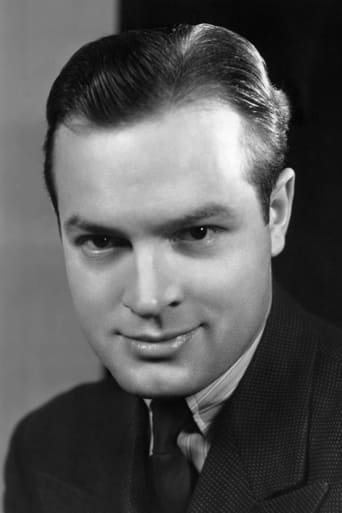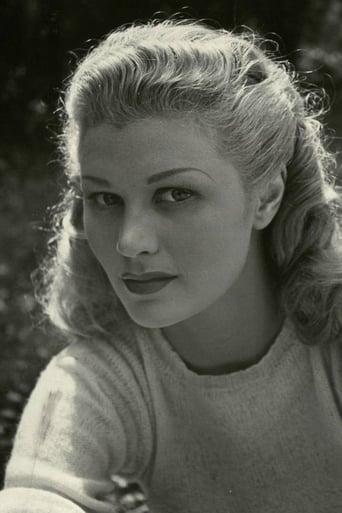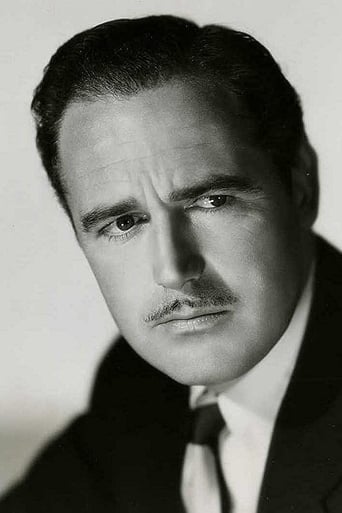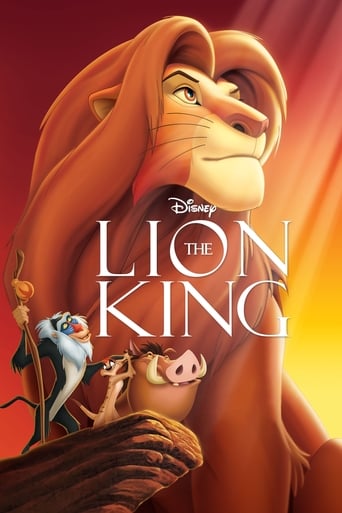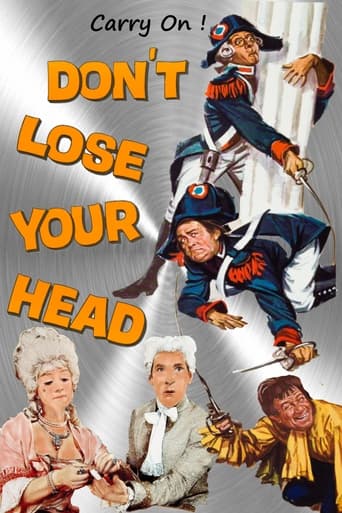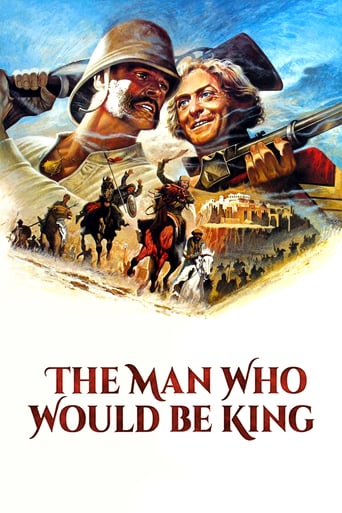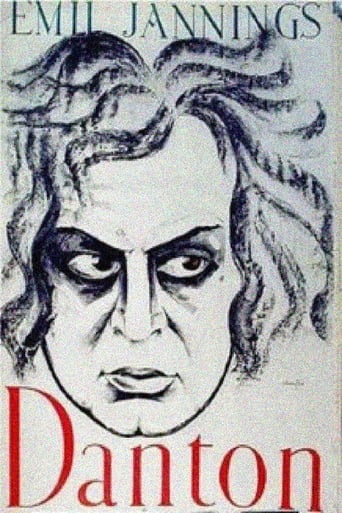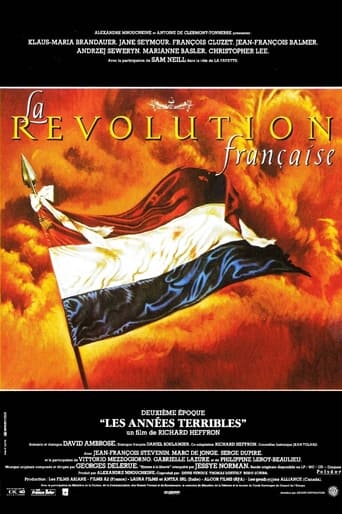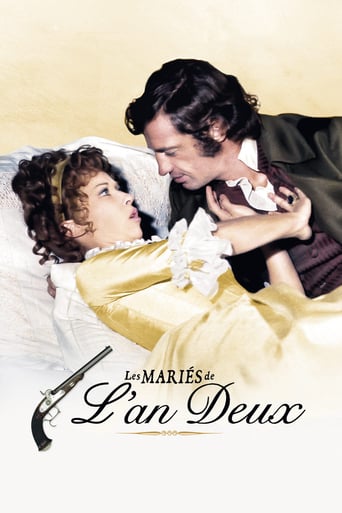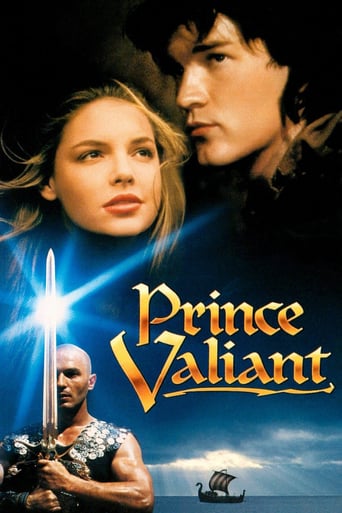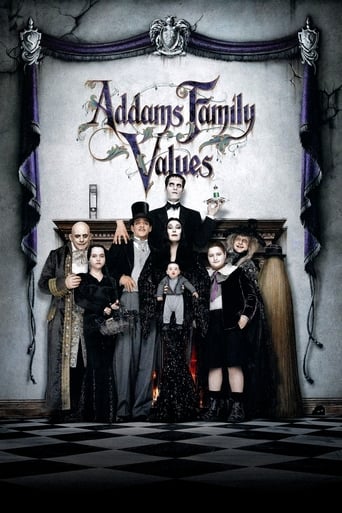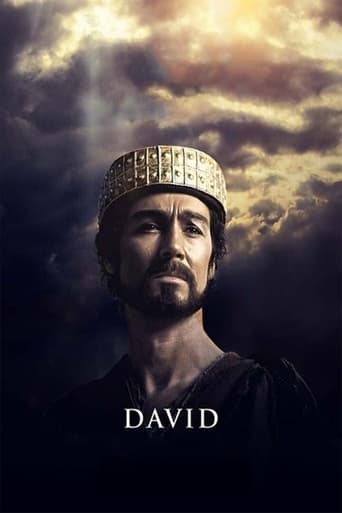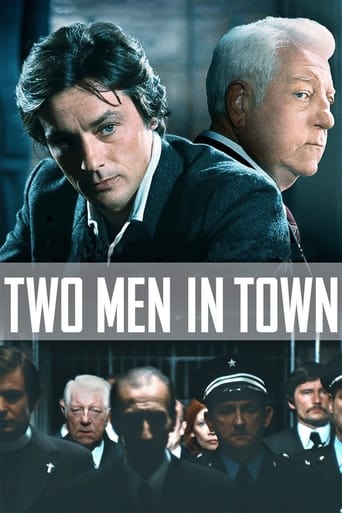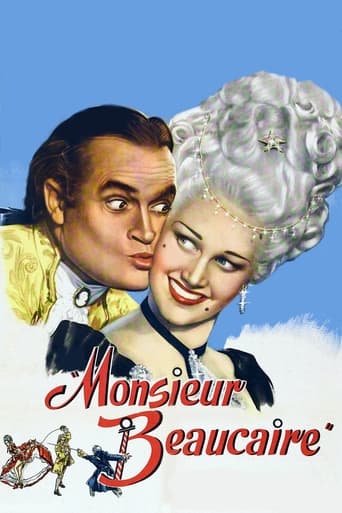
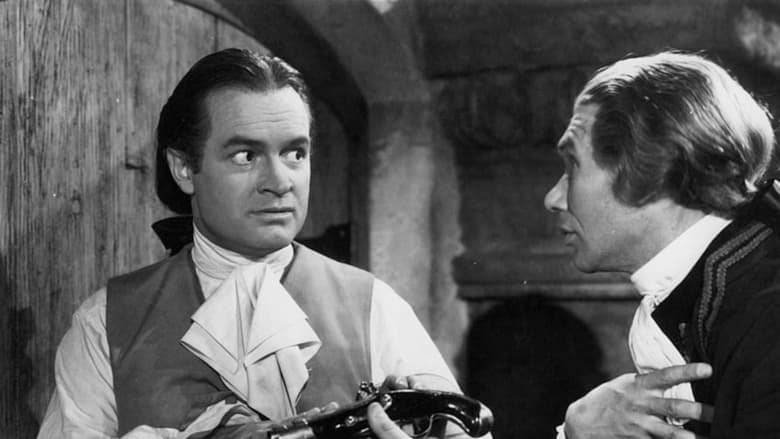
Monsieur Beaucaire (1946)
A bumbling barber in the court of King Louis XV becomes engaged in political intrigue when he masquerades as a dashing nobleman engaged to the princess of Spain.
Watch Trailer
Cast


Similar titles
Reviews
In this one, Bob Hope is Beaucaire, the French barber to the king. Beaucaire is in love with the maid Mimi, played by Joan Caulfield. Mimi has bigger ambitions, and gives him the brush off. Part of the joke here is that Hope disparages the king, the queen, and the royalty in general quite openly, when in real life, he would quickly be punished for it. Fun scene near the beginning where Beaucaire helps to hide Madam Pompadour, while pretending to give the Duke a shave. I was never a fan of period pieces, and if this weren't a Hope project, I probably would have turned it off. Mimi is sent off to Spain, and the real Duke, and Beaucaire dressed as the Duke end up there a well. Some fun recognizable faces in here... Cecil Kellaway, Reginald Owen, and Constance Collier for supporting cast. The musical numbers were completely un-necessary, and should have been eliminated. It's a grand adventure, with more meat on the bones that most of Hope's quick little comedies. The sword fight at the end goes on way too long. This one is okay. Not Hope's best. Directed by George Marshall. They had worked together on numerous films.
Foppish skewering of the Booth Tarkington novel, previously filmed with Rudolph Valentino in 1924, casts Bob Hope (in dryly engaging form) as a barber in the French Court of King Louis XV who inadvertently gets his chambermaid-sweetheart banished to Spain; he follows her there while impersonating the Duc de Chandre, a notorious ladies' man who is to be married in an act of patriotism to the Princess of Spain. Seems lengthy at 93 minutes, with a few peaks and valleys in the plotting, and yet it's relaxed and pleasant enough to be palatable to even non-Hope buffs. Still, ace screenwriters Melvin Frank and Norman Panama don't know when to quit, and even the funny tag at the end is ultimately spoiled by unnecessary silliness. A couple of nice songs by Ray Evans and Jay Livingston, a good production, and a funny duel (with Hope's ski-slope nose getting caught in the harp strings) make for a fitfully amusing time. ** from ****
This film was done when Hope was at or near the peak of both his film popularity and his comic abilities. Based on a Booth Tarkington novella, which had served Rudolph Valentino with mixed results in 1924 (he acted well, but the part labeled him as gay with certain male critics), the story is how Hope is the barber at Versailles to King Louis XV (Reginald Owen), gets into serious hot water with the King and Queen (Constance Collier) and is forced to flee the palace disguised as the Duc de Chandre (Patrick Knowles). Owen has sent Knowles to Spain to get rid of him (he's a rival for Madame de Pompadour - Hillary Brooke), and to have him marry the daughter of the King of Spain (Marjorie Reynolds, who is daughter to Howard Freeman). But Knowles is a target for an assassination by minions of the head of the Spanish Army (Don Francisco - Joseph Schildkraut). So Knowles and his associate (Cecil Kellaway) let Hope masquerade as Knowles. Knowles, in the meantime, is looking for the delightful looking woman he met on the way to Spain - he does not realize it is Reynolds. And Hope keeps crossing paths with his old girlfriend, Mimi (Joan Caulfield), who is furious at him for getting her banished from France accidentally.In 1946 Hope was between 44 and 42 years old, so physically he still looked reasonably presentable as a man (when properly made up with make-up) who is in his 30s. That helps considerably. Compare this film to it's Technicolor counterpart in the middle 1950s, CASANOVA'S BIG NIGHT. In that film the plot is very similar, but the middle aged man, with the middle aged spread is not believable as even a comic substitute for the great lover. He is just plausible in BEAUCAIRE. He also demonstrates his timing is sharper, and he even demonstrates (possibly accidentally, but one wonders) a gift for mimicry. At one point he is speaking when behind a mask as though he is Owen, and he momentarily does capture something of the speech pattern and bluster of the English actor.As pure escapism the film is more than adequate. As history it is questionable. Schildkraut is a type of Spanish Napoleon, wanting to overthrow the royal family in a war between Spain and France. Hence the need for the royal marriage that involves Knowles and Reynolds. But the military in Spain in the 18th Century produced no such figure as Don Fernando (it is hard to believe the screen writers Norman Panama and Melvin Frank were thinking of a later adventurer and court favorite Count Godoy). Owen is quite good at being Louis (he had played the role a decade earlier in the George Arliss film VOLTAIRE). The year is never giver - actually it is quite vague, but 1765 seems the most probable year: At one point Collier and Owen are reminiscing about their wedding. Queen Marie (the daughter of the King of Poland) married Louis in 1725, and Owen mentions they've been married 40 years). The Queen died in 1768, and Louis died in 1774. The problem is that the Spanish King is Philip II in the cast. King Philip II of Spain ruled from 1555 - 1598. The King of Spain in 1765 was Carlos III (notable for a number of reforms, and being reluctantly drawn into policies by the French). You see, the Bourbon Family had begun ruling Spain in 1714, at the end of the War of the Spanish Succession, when King Louis XIV's second oldest son became King Philip V of Spain (the Philip they screenwriters were probably thinking of). But the so-called "Family Compact" united the foreign policies of Spain and France for most of the 18th Century. So the threat of a war between the two countries never really existed in history at this time.There are many nice touches in the film: Hope's attempt at suicide (with an unknotted hangman's noose) that is almost pushed to completion by his friend Leonid Kinski; Hope's mimicry of Owen (mentioned above); the climactic duel between Hope and Schildkraut, in which both men get entangled with a harp and a cello. Caulfield and Knowles both get a chance to sing. And Hope even (with Schildkraut's assistance) gets a passing shot (literally) at his rival/friend from the "Road" Pictures. It remains an entertaining spoof, and one of Hope's best comedies.
A "costume comedy" of the sort occasionally essayed by Bob Hope, this "version" of the Booth Tarkington novel is meant as a pastiche of the 1924 Rudolph Valentino film, but the one-liner master extraordinaire and his favourite scriptors, Melvin Frank and Norman Panama, can not resist going their own way, and a comically winning tangent it is. Splendidly directed by George Marshall, with top-flight cinematography and editing by Lionel Lindon and Arthur Schmidt, respectively, the action unfolds in the royal courts of 18th century France and Spain, nations on the verge of war. As the barber for King Louis XV (Reginald Owen), Beaucaire (Hope) finds himself in a situation where he must impersonate a nobleman, the Duc Le Chandre, or lose his head, whereas in the Tarkington original his impersonation is clearly of his own choosing. Meantime, in Madrid, conniving Don Francisco, commander-in-chief of the Spanish army, desires to prevent the upcoming marriage of the actual Le Chandre (Patric Knowles) with Spanish Princess Maria (Margaret Lindsay), by assassination if necessary, in order to destabilize the crown, leading to armed hostilities between the neighbouring countries and an opportunity for him to organize a coup. The false Duke, Beaucaire, becomes the prospective victim of this homicidal chicanery and we view him at his wedding ceremony where desperate measures must be taken to avoid being captured and then killed in quick succession. Hope's gags are beyond counting, some of them quite funny and all featuring his perfect timing, and a scene at the Spanish court that satirizes the use of the lorgnette by the nobility is classic, while there is pulchritude galore with three excellent actresses: Joan Caulfield as Beaucaire's true love Mimi, Hillary Brooke as Mme. Pompadour, and the lovely Lindsay, given her first role since Paramount picked up her contract. Also to be commended for their sharp performances in this fast-moving frolic are the swashbuckling Knowles, Schildkraut, Owen, Cecil Kellaway and Constance Collier, while Hope is supported for the first time by songs from Ray Evans and Jay Livingston, contributors to 11 subsequent films by the comedian, whose work here was Woody Allen's inspiration for the latter's LOVE AND DEATH.


